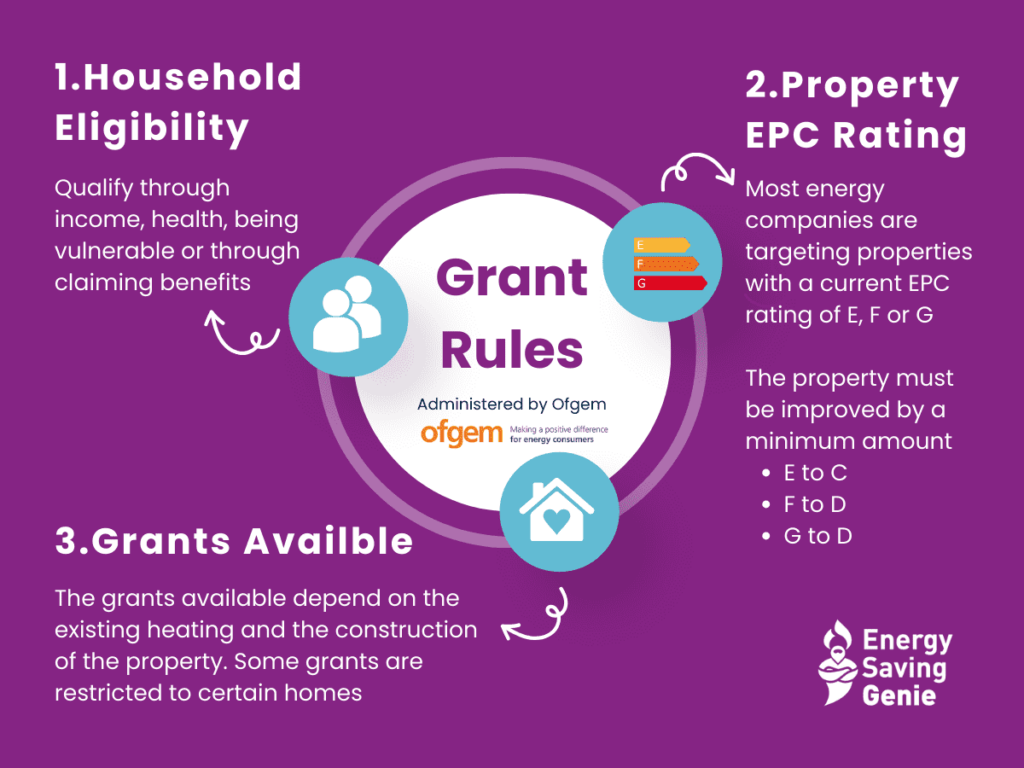1. Do pensioners qualify for free energy saving grants?
The types of grants available to pensioners include:
- Heating upgrade grants, are available for people who have old, inefficient heating systems. There is also help with the cost of complete central heating installing that includes fitting radiators, but only if the property has never had central heating.
- Insulation grants, which are available for people who want to install loft insulation, underfloor or wall insulation.
- Smart thermostat grants are available in some areas and they'll cover the installation of smart thermostats that can help you to control your heating from your devices and manage energy usage.

2. How do you qualify for free energy saving measures as a pensioner?
Property eligibility + Household eligibility + Grant suitability and availability

Property eligibility
Household eligibility
Grant suitability and availability

Eligibility through claiming benefits:
- Child Tax Credit
- Employment and Support Allowance (ESA) - income-based (not contribution-based ESA)
- Housing Benefit
- Income Support
- Jobseeker's Allowance (JSA) - income-based (not contribution-based JSA)
- Pension Guarantee Credit
- Pension Savings Credit
- Tax Credits (both Child Tax Credit and Working Tax Credit)
- Universal Credit
- Working Tax Credit


If you don’t know what rating your property has:
The EPC for your property will contain:
- A summary of a property’s energy use and typical costs
- Recommendations for energy saving improvements
3. What grants are available to pensioners?

To be eligible for the central heating grant the heating at your property would need to be one of the following:
- Electric fan heaters
- Electric panel heaters
- Electric room heaters
- Electric storage heaters
- Gas room heaters*
- LPG room heaters
- No heating at all
- Oil room heaters
- Solid fuel heating
- Wood/biomass heaters
* The scheme rules place an emphasis on existing heating so if this is the main heating at your property you might have to pay towards the installation, but it is still likely to be subsidised.
To be eligible for a storage heater grant the heating at your property would need to be one of the following:
- Electric fan heaters
- Electric panel heaters
- Electric room heaters
- Electric storage heaters (in come cases there are grants where the existing heating is a storage heater providing they are old and inefficient)*
- LPG room heaters
- No heating at all
- Oil room heaters
- Solid fuel heating
- Wood/biomass heaters
The scheme rules place an emphasis on existing heating so if this is the main heating at your property you might have to pay towards the installation but it is still likely to be subsidised.
To be eligible for a free boiler grant or central heating installation your existing needs to be one of the following:
- Non-condensing gas boiler
- Back boiler
- Gas room heaters
- Warm air gas system
The scheme rules place an emphasis on existing heating and if the property is eligible (not all are) the installation will be 100% free.
To be eligible for a roof or room in roof insulation grant your existing heating. needs to be one of the following:
- Most heating types are eligible for roof insulation
The scheme rules place an emphasis on existing heating. Electric heated properties receive the highest funding for underfloor insulation. If your property is heated by a mains gas boiler or gas room heaters underfloor insulation is usually on funded when installed alongside a boiler (sometimes called a dual measure).
3. How much money could pensioners save by upgrading heating systems or by installing insulation?
4. How much money could pensioners get if they apply for a grant?
5. Why is it important to take advantage of these grants?
Don’t wait to apply for these grants as the rules can change at any time. There is currently over £4 billion up for grabs and, if you qualify, you could be eligible for thousands of pounds of free home improvements.
The money you save by upgrading your heating system or installing insulation could make all the difference in paying off that new appliance or making sure you have enough on hand when winter comes around again – so don’t wait any longer.
See if you qualify today!
Apply for a grant
Check eligibility for grants
Fill in the short form to see if you are eligible for Government grants.



